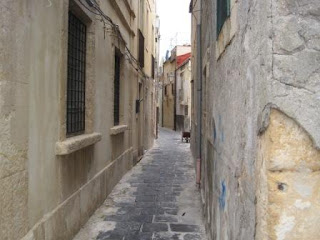Last weekend after a beautiful ride through the Anapo valley, we headed out to find a restaurant for Sunday lunch and ended up on the touristy side of the island, i.e. the Porto Grande, where the cruise ships dock and empty their little swarms into the city for the day. There are good restaurants here and also the risk of tourist traps, but when we stuck our head into a place that was full of Italians, we figured it was a good bet. Well, we lost the bet. Actually, it wasn’t bad, it just wasn’t special – the service was a little brusque and the prices were a little high. The house wine—rosé only—was too sweet, the salad was too plain, the shrimp in the pasta were too small... Wow, I’m sounding like a whiner even to myself.
Anyway, the point of the story is that you can get something great out of even mediocre restaurants; in this case, it was the bread: a wonderful loaf with thick crunchy crust and a chewy, moist interior. I asked the waiter whether one could get this bread in town.
“Of course,” he replied, “from Drago.”
“Where is that?” I asked, imagining a white-tiled bakery with a glass case and cheerful young women with little hats and aprons calling the number of the next person in line.
“Ooooh,” he groaned, scratching his head, “it’s Sunday and everything is closed.”
“I know, I mean for another day. We’ve just moved here and we’re still looking for the perfect bread.”
A look of sympathy spread over his face. “It’s in….mamma mia…Piazza, ummm, what’s it called, Piazza Gargullo—around there.”
As soon as we got home, I looked it up on the web, wrote down the address, located it on the map (just a few hundred meters from our house) and the next morning sent Larry out to find it.
He was gone a long time.
Eventually, he marched back through the door, breadless. “Well, I found your bakery…finally!” he said. “But you can’t buy bread there.” He went on to tell a story of winding through little residential streets (as the photos show) with no apparent storefronts, other than one, which when he barged in, he discovered to be a furniture restorer. He was just about to give up when he saw a guy carrying a huge basket full of bread. He went back to where the guy had come from, through an archway, and ended up in a little courtyard, with the smell of fresh bread in the air and a grumpy guy scraping cornmeal off huge pans into the trash. The guy gave him a stare, as if to say, “What are YOU doing here?” and Larry surmised that this was not a retail bakery. So much for my fantasy of the cheerful young women in the white hats.
We continued to experiment with various bread sellers during the week, but Saturday morning we were strolling through the neighborhood when we saw an old man on a scooter with a bag full of bread on his handlebars. “I bet that guy’s coming from the bakery,” I said.
“Yeah, I saw him before,” Larry replied. “He must be the delivery man.”
“Look at that street sign,” I said. “Ronco Antonio Drago, Panificatore – they named the street after the baker—that must be where the bakery is.”
“That IS where it is,” said Larry.
About then, a man in his sixties who was just slightly overdue for a shave and haircut, looked over and said, “What are you looking for?”
He wasn’t threatening, but wasn’t exactly inviting, either. I stalled, trying to construct a sentence in my head.
“Do you want bread? Fresh bread? Nice and warm? Follow me, signora.”
He took us into the courtyard and Larry said, “This is where I came, but there was no one here selling bread, though they were making a lot of it.”
We went to an open door where a young man with a white cloth tied around his waist was standing amidst white plastic crates of different kinds of bread.
“The signora would like some bread,” our guide announced as he seamlessly exchanged a few coins for his own loaf and left. The young man looked at me as if to ask what kind I wanted. There were flat ciabattas, long baguettes, even some whole wheat rolls.
“Just a ciabatta, today,” I said.
“Sessanta,” he replied, slipping the still-warm loaf into a paper bag and handing it to me.
We paid him the sixty cents and headed back out into the street with our warm bread, winking at our guide as we turned the corner of the secret street named after the bread man, Antonio Drago.






No comments:
Post a Comment